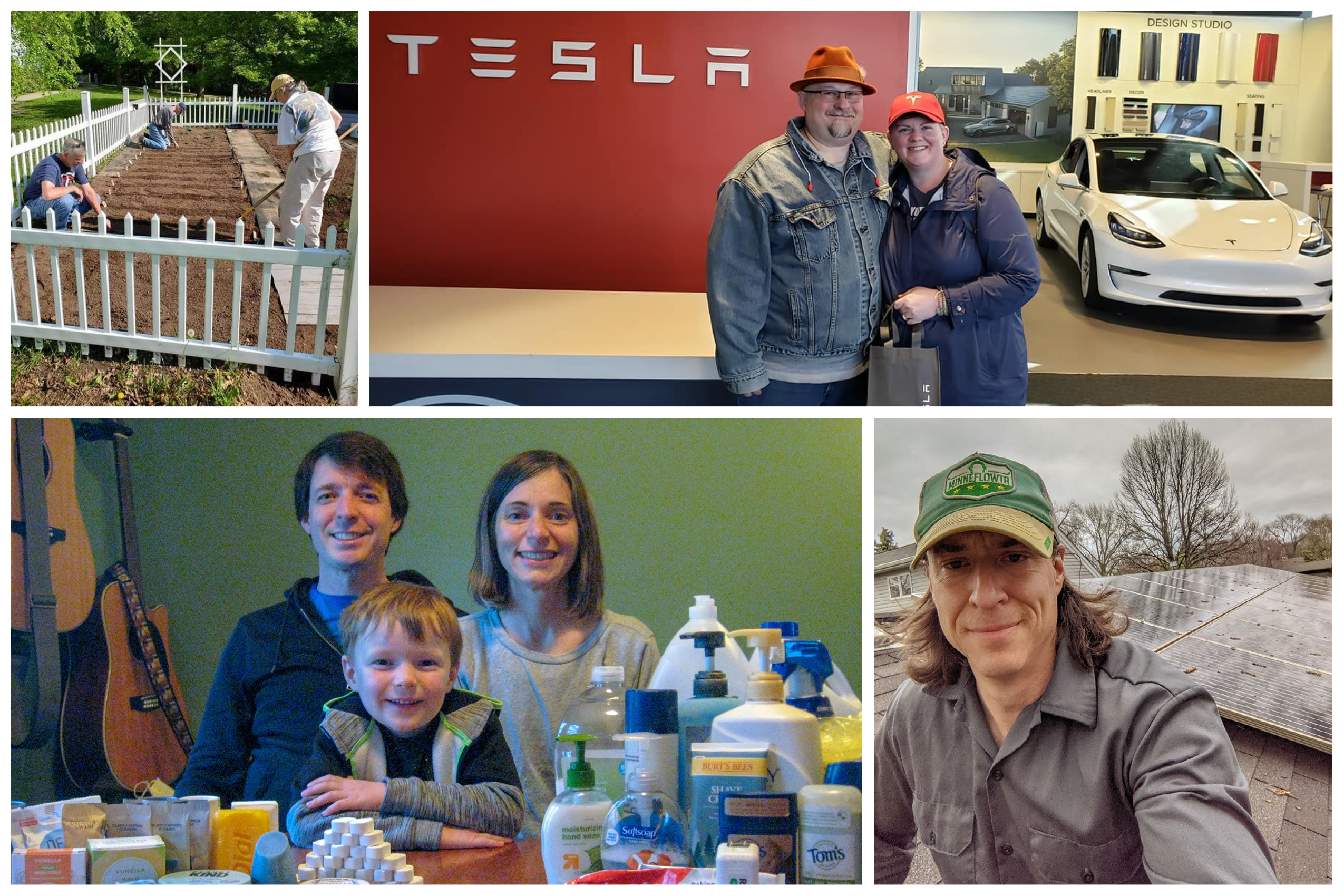 As an organization, Metro Transit has taken several steps to deepen its commitment to sustainability.
As an organization, Metro Transit has taken several steps to deepen its commitment to sustainability.
Over the past several years, nearly all the lights at support and public facilities have been converted to energy-efficient LEDs. Through expanded recycling and composting efforts, around a quarter of the material collected at support facilities is being diverted from the waste stream. Solar arrays have been installed atop several support facilities and will also be a feature of the new Minneapolis Bus, where an enormous tank will hold rainwater that would otherwise runoff into nearby waterways.
Outside of work, many Metro Transit employees are also doing their part to protect the environment. The examples below are being shared to help encourage others to do their part, on Earth Day and every day.
Robert Rimstad, Manager-Engineering Services, Joe Johnson, Senior Project Coordinator, Southwest Project Office and Bruce Fenlason, SCADA Systems Administrator, Southwest Project Office
A few years ago, we were working together on some light rail projects and started to talk about installing solar panels at our homes. Over the next few months, we talked about the cost, rebate programs and what it would take to install the systems ourselves. We worked together through all the permitting, purchasing and installation work. All of us have enjoyed the energy savings and the chance to reduce our carbon footprint. Combined, our systems have saved about 216,000 tons of CO2 emissions since installation, the equivalent of planting 1,633 trees.
Lisa Benson, Schedule Coordinator
Due to the pandemic, I haven’t been able to give conservation and composting talks at the Minnesota Zoo nor tend to our gardens there. All the food I help grow at the zoo is used to feed patrons as part of the farm to fork program. Without being able to work at the zoo this past year, I’ve focused on my home garden, which includes a vegetable garden and a pollinator garden to help support our local bee population.
David Dieken, Bus Operator/Garage Instructor/Wellness Champion
Biking has been a passion my whole life, not just for recreation but as a way to get from point A to point B. I’ve been a year-round commuter since the mid-90s. Right now, I have a fantastic 20-mile round trip commute from near Lake Nokomis along West River Parkway to Heywood Garage. In addition, I keep things simple to reduce my carbon footprint, like buying used or local whenever possible. But mostly, I try not to own that much stuff. At the garage, I always have at least two or three thermoses to avoid purchasing from machines and carry most of my lunch in reused bags to cut down on plastics. At home, we are heavy recyclers and use our organic bin as much as possible.
Brian St. Louis, Rail Transit Supervisor
The planet is already dying, and it’s primarily due to industry, but I feel you can’t criticize that if you don’t take proper steps yourself. My parents composted and now that I have my own place I do it there. Composting is where you use rotten foodstuff or other biodegradable items and let them all rot in a big pile in the yard, then use that as fertilizer. We regularly shop at this place where you take in your own empty containers and fill them with rice, honey, shampoo, etc., and pay by weight, re-using containers you already have. I also bought an electric car and us a reusable K-cup at work.
Shaun Morrell, Manager, Scheduling and Systems
My family and I have been on a mission to reduce plastic waste in our household, out of concern for pollution it causes. We buy more low-waste products, like bar-form and tablet-form soap, shampoo, toothpaste, detergent, and household cleaners. We bring reusable shopping bags and food containers everywhere. We make toys and artwork out of recycled materials. We buy used home furnishings from Craigslist and secondhand stores. And, we try to reuse, recycle, or compost to the extent we can. These efforts have helped us make a noticeable dent in the amount of waste we throw out. We are not a zero-waste household (yet), but we are always looking for ways to generate less of it.
Craig and Angela Molde, Mechanic Technician and Lead Stockkeeper
We purchased a 2018 Tesla Model 3 as our carpooling commuter to Heywood Garage, which is 50 miles from our house. Our decision to purchase an electric vehicle was based on many reasons -- reduced emissions and personal carbon footprint, savings in operation and maintenance costs, dependability, high-rated safety features and the ability to “re-fuel” at home. It is important to us that the electricity we rely on comes from domestic sources that are rapidly expanding the charging network and producing cleaner energy.